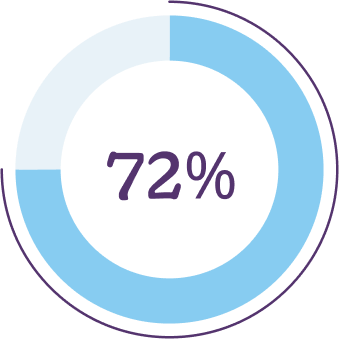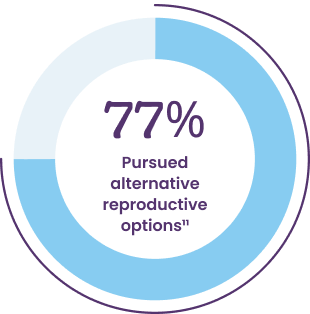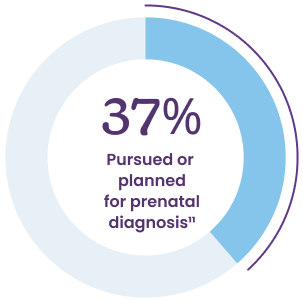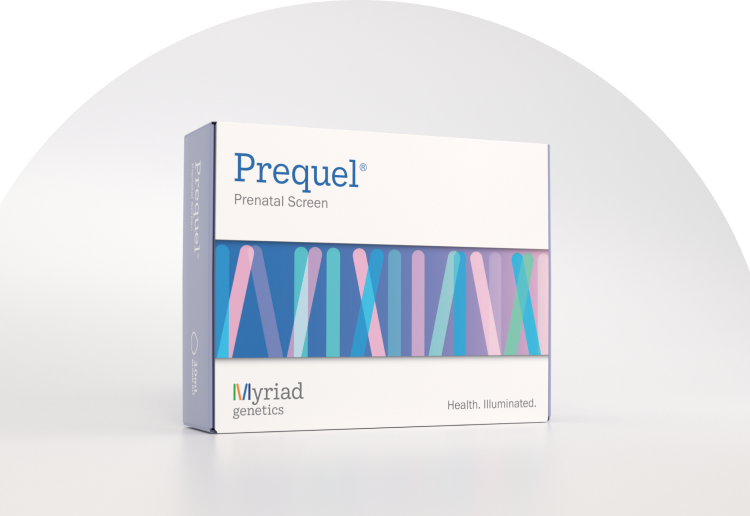
Provide accurate, equitable care with
expanded carrier screening
Expanded carrier screening with the Foresight Carrier Screen more accurately detects couples’ risk of passing on recessive conditions than screening for conditions based on their association with ethnicity alone.3
1 in 22
couples* identified as at-risk for passing on serious inherited conditions—the highest published detection rate3
*screened with the Universal Panel
272
genes associated with serious conditions can be screened for across multiple Foresight panels4
>99%
detection rate for the majority of genes in Foresight panels5
Understanding genetic risks sooner
Carrier screening can help save some families years of stress, anxiety, and cost pursuing a diagnosis.
The path to diagnosing rare diseases:

Yet 72% of rare diseases are genetic, and carrier screening can lead to earlier diagnoses and possibly life-changing treatments, faster.8
Experience the convenience of tandem reflex with the Foresight Carrier Screen
Tandem reflex simplifies partner carrier screening by drawing samples from the couple in one appointment. In order to facilitate timely results, the sample from your patient’s partner will only be processed if your patient tests positive. After the screening is complete, one easy-to-read combined report offers couples a clear view of their overall reproductive risk.
Avoid repeat testing with Next Generation Sequencing
Foresight uses Next Generation Sequencing, which detects variants with superior sensitivity.9 This can prevent the false positives and negatives that burden your patients and your practice. In hemoglobinopathies such as sickle cell disease (Hb S), detecting carrier status helps hopeful parents explore genetic counseling and treatment options earlier. Yet, low specificity of traditional screening often leads to variant misidentification. A recent study showed how Foresight could have helped a patient get more accurate results and peace of mind in fewer steps.9
| Traditional Screen | Foresight Carrier Screen | |
|---|---|---|
| Step 1 | Patient tests with traditional carrier screening panel | Patient tests with Foresight Carrier Screen for clinically actionable, pathogenic hemoglobinopathy variants |
| Step 2 | Results indicate that they may be a heterozygous carrier for sickle cell disease (Hb S) | Patient is found to be heterozygous for Hb Hasharon—a variant that mimics Hb S but is not pathogenic |
| Step 3 | Patient undergoes testing again with heterozygous (Hb S) carrier results | Not necessary |
| Step 4 | Patient undergoes testing of all hemoglobinopathy variants including those that are not clinically actionable | Not necessary |
| Step 5 | Patient is found to be heterozygous for Hb Hasharon—a variant that mimics Hb S but is not pathogenic | Not necessary |
| Step 1 | Step 2 | Step 3 | Step 4 | Step 5 |
|---|---|---|---|---|
| Traditional Screen Patient tests with traditional carrier screening panel |
Results indicate that they may be a heterozygous carrier for sickle cell disease (Hb S) |
Patient undergoes testing again with heterozygous (Hb S) carrier results |
Patient undergoes testing of all hemoglobinopathy variants including those that are not clinically actionable |
Patient is found to be heterozygous for Hb Hasharon—a variant that mimics Hb S but is not pathogenic |
| Foresight Carrier Screen Patient tests with Foresight Carrier Screen–Foresight screens for clinically actionable, pathogenic hemoglobinopathy variants |
Patient is found to be heterozygous for Hb Hasharon—a variant that mimics Hb S but is not pathogenic |
Not necessary |
Not necessary |
Not necessary |
Offer high-quality, customized screening
Myriad Genetics processes carrier screening in-house, which lets us control test quality and develop custom assays.
Foresight Spotlight on Congenital Adrenal Hyperplasia
Choose between panel options to tailor screening to your patient
Myriad pioneered the first expanded carrier screening to maximize detection of at-risk couples. Our goal is to produce not simply more information, but clinically meaningful information.3,4 We offer four standard panels:
Fundamental
Cystic fibrosis, spinal muscular atrophy, and fragile X (Opt-in)
Fundamental Plus
Focused set of 14 conditions, including ACOG-recommended conditions associated with ethnicity
Universal
176 conditions associated with serious and prevalent inherited conditions
Universal Plus
Comprehensive panel of 267 conditions, including ACMG Tier 3 category recommended conditions
When patients get insights from carrier screening, they use it!
Retrospective analysis of at-risk couples
Preconception

Prenatal

Who is Foresight for?
See types of patients who would be a good fit for the Foresight Carrier Screen.

No significant risk
No significant risk factors, but 86% of high-risk pregnancies are missed without expanded carrier screening12

Family history risk
Family planning with risk factors due to:
- Ancestry or family history in either parent

References:
- American College of Obstetricians and Gynecologists’ Committee on Practice Bulletins—Obstetrics; Committee on Genetics; Society for Maternal-Fetal Medicine. Screening for Fetal Chromosomal Abnormalities: ACOG Practice Bulletin, Number 226. Obstet Gynecol. 2020;136(4):e48-e69. doi:10.1097/AOG.0000000000004084.
- Gregg A.R., et al. Screening for autosomal recessive and X-linked conditions during pregnancy and preconception: a practice resource of the American College of Medical Genetics and Genomics (ACMG). Genet Med. 2021;23(3). 1793–1806. doi:10.1038/s41436-020-01009-5.
- Hogan GJ, et al. Validation of an Expanded Carrier Screen that Optimizes Sensitivity via Full-Exon Sequencing and Panel-wide Copy Number Variant Identification. Clinical Chemistry. 2018; doi:10.1373/clinchem.2018.286823.
- Myriad Genetics Launches New Universal Plus Panel for Foresight® Carrier Screen. Myriad Genetics. Published January 3, 2024. Accessed June 16, 2025. https://investor.myriad.com/news-releases/news-release-detail/25236/.
- Foresight® Residual Risk Table. https://myriad-library.s3.amazonaws.com/mwh/disease-detection-fact-sheet.pdf.
- Global Genes, Accurate Diagnosis of Rare Diseases Remains Difficult Despite Strong Physician Interest, Published March 6, 2013, Accessed March 21, 2022 https://globalgenes.org/2014/03/06/accurate-diagnosis-of-rare-diseases-remains-difficult-despite-strong-physician-interest/.
- Kingsmore, S. Comprehensive carrier screening and molecular diagnostic testing for recessive childhood diseases. PLoS Curr. 2012;4:e4f9877ab8ffa9. Published 2012 May 2. doi:10.1371/4f9877ab8ffa9.
- Nguengang Wakap S, et al. Estimating cumulative point prevalence of rare diseases: analysis of the Orphanet database. Eur J Hum Genet. 2020;28, 165–173. doi:10.1038/s41431-019-0508-0.
- Collins L, et. al. A tale of two Hbs: DNA sequencing and hemoglobin electrophoresis. 2022;24(3).
- Nimkarn S, et al. (Updated 2016 Feb 4). In: Adam MP, Ardinger HH, Pagon RA, et al., editors. GeneReviews® (Internet). Seattle (WA): University of Washington, Seattle; 1993- 2018. Available from: https://www.ncbi.nlm.nih.gov/books/NBK1171/.
- Johansen Taber KA, et al. Clinical utility of expanded carrier screening: results-guided actionability and outcomes. Genet Med. 2019;21(5):1041-1048. doi:10.1038/s41436-018-0321-0.
- Haque IS, et al. Modeled fetal risk of genetic diseases identified by expanded carrier screening. JAMA. 2016; 316(7):734-742. doi:10.1001/ jama.2016.11139.